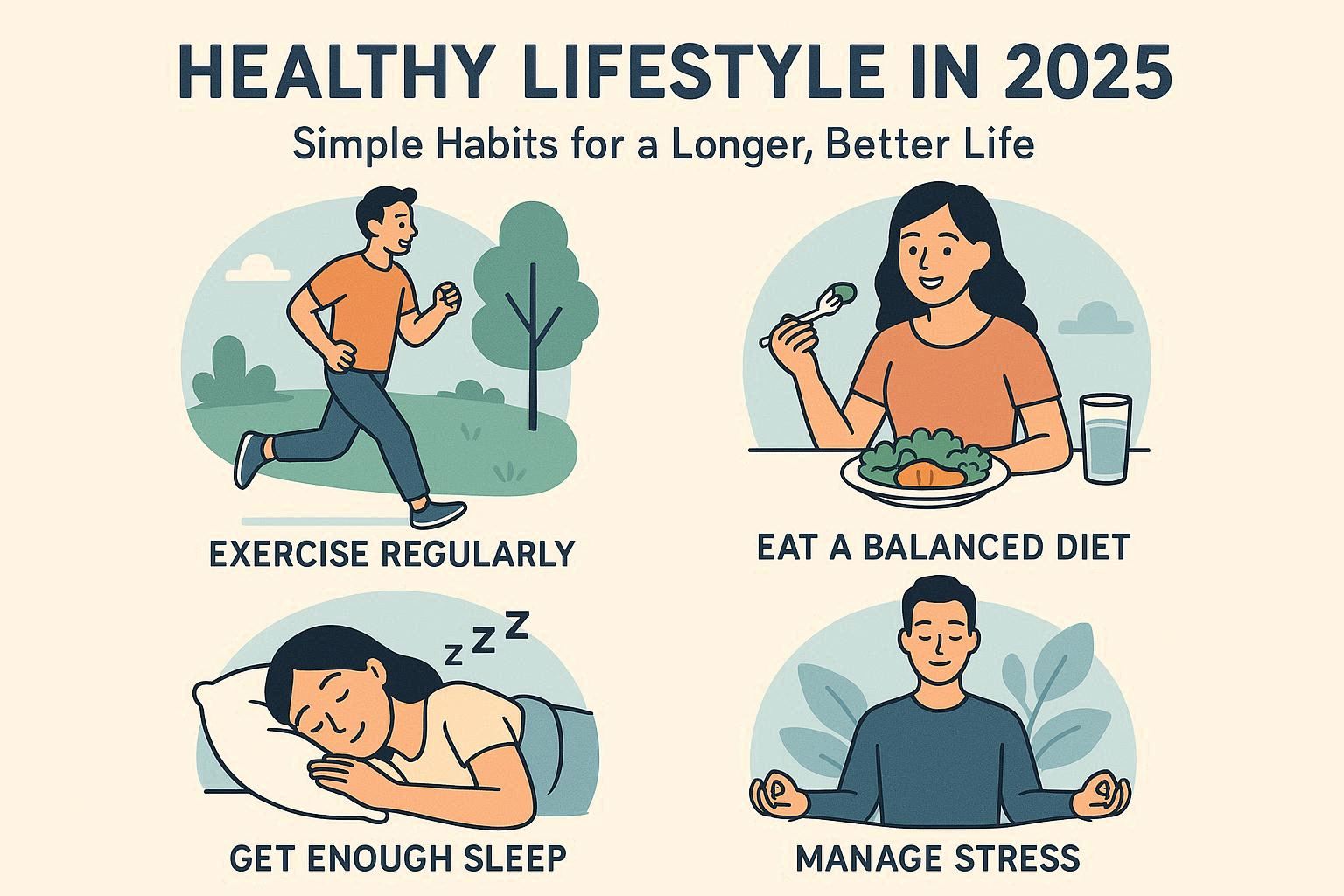Health has always been the foundation of a happy and productive life. In 2025, with technology, fast-paced lifestyles, and global challenges, people are more focused than ever on building healthier routines. A healthy lifestyle is no longer just about avoiding illness—it is about creating balance, energy, and long-term wellness. The good news is that even small daily habits can lead to big improvements in overall health.
This article explores simple and practical ways to live healthier in 2025, covering nutrition, exercise, mental well-being, sleep, and the role of technology in personal wellness.
1. The Importance of a Healthy Lifestyle
Living a healthy lifestyle is about making conscious choices every day that support physical, mental, and emotional well-being. Modern research shows that people who follow healthy habits have a lower risk of chronic diseases, more energy, and a higher quality of life. In addition, maintaining good health can reduce medical expenses, improve focus at work, and strengthen personal relationships.
2. Nutrition: Fuel for the Body
Food is more than just calories—it is the fuel that powers your body and mind. In 2025, nutrition trends emphasize natural and whole foods over processed options. Here are some essential guidelines:
- Eat Whole Foods – Focus on fruits, vegetables, lean proteins, whole grains, and healthy fats.
- Stay Hydrated – Drinking enough water is crucial for energy, digestion, and brain function.
- Balanced Meals – Try to include protein, fiber, and healthy fats in every meal for lasting energy.
- Limit Processed Foods – Reduce sugar, fried foods, and artificial additives.
Tip: Meal planning and cooking at home are cost-effective ways to ensure healthy eating without overspending.
3. Exercise: Movement for Longevity
Regular physical activity is one of the most powerful habits for long-term health. Exercise strengthens the heart, builds muscles, improves flexibility, and supports mental well-being. The World Health Organization recommends at least 150 minutes of moderate exercise per week. Popular fitness practices in 2025 include:
- Home Workouts – Online platforms and apps make exercising at home easier than ever.
- Smart Gyms – High-tech equipment provides personalized training programs.
- Outdoor Activities – Walking, running, cycling, and hiking combine fitness with stress relief.
- Mind-Body Fitness – Yoga, Pilates, and tai chi improve flexibility, balance, and relaxation.
4. Mental Health: The Core of Wellness
In recent years, mental health has gained equal importance as physical health. Stress, anxiety, and burnout are common challenges in modern life. To maintain mental well-being:
- Practice Mindfulness – Meditation and breathing exercises reduce stress and increase focus.
- Maintain Social Connections – Spending time with friends and family improves emotional resilience.
- Limit Screen Time – Too much exposure to screens can affect mood and sleep.
- Seek Balance – Prioritize work-life balance to prevent burnout.
Even small steps like journaling, taking short breaks, or spending time in nature can significantly improve mental health.
5. Sleep: The Secret to Recovery
Sleep is the body’s natural repair system. Lack of proper rest can lead to fatigue, poor concentration, and long-term health problems. Experts recommend 7–9 hours of quality sleep per night. To improve sleep quality:
- Create a regular sleep schedule.
- Avoid caffeine and heavy meals before bedtime.
- Keep screens out of the bedroom.
- Use relaxation techniques like reading or calming music.
Technology in 2025 also supports better sleep, with apps and wearables tracking patterns and suggesting personalized improvements.
6. The Role of Technology in Healthy Living
Technology is no longer just about convenience—it plays a vital role in health. In 2025, people use digital tools to monitor and improve their well-being:
- Wearables – Smartwatches track steps, heart rate, sleep, and more.
- Health Apps – Mobile apps provide reminders for hydration, workouts, and mindfulness.
- Telemedicine – Online consultations make healthcare more accessible.
- AI-Powered Coaching – Personalized plans based on data help individuals achieve their health goals.
7. Preventive Healthcare
One of the biggest shifts in 2025 is the emphasis on prevention rather than treatment. Preventive healthcare includes:
- Regular check-ups and screenings.
- Vaccinations and updated immunizations.
- Early detection of conditions through smart devices.
- Healthy lifestyle choices that reduce long-term risks.
This proactive approach saves costs, improves quality of life, and increases life expectancy.
8. Building Consistency: The Key to Success
The challenge of living a healthy lifestyle is not starting—it is maintaining consistency. Small daily choices matter more than extreme short-term diets or workouts. Tips for building consistency include:
- Set realistic goals.
- Track your progress using apps or journals.
- Celebrate small wins.
- Stay motivated with community support or accountability partners.
Conclusion
A healthy lifestyle in 2025 is about balance, awareness, and the smart use of technology. By focusing on nutrition, exercise, mental health, sleep, and preventive care, anyone can improve their quality of life and increase longevity. The journey toward better health does not require perfection—only consistent, positive choices each day. Start small, stay consistent, and watch your health transform over time.

